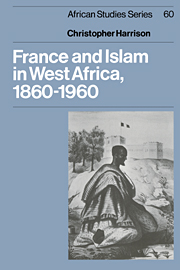Book contents
- Frontmatter
- Contents
- Acknowledgements
- Abbreviations
- Map
- 1 Introduction
- PART I 1850–1898: NINETEENTH-CENTURY ORIGINS OF FRENCH ISLAMIC POLICY
- PART II 1898–1912: THE FEAR OF ISLAM
- Introduction
- 3 The fear of Islam
- 4 Education policy and Islam
- 5 French Islamic policy in crisis: the Futa Jallon 1909–1912
- PART III FRENCH SCHOLARSHIP AND THE DEFINITION OF ISLAM NOIR
- PART IV 1920–1940: THE FRENCH STAKE IN ISLAM NOIR
- Notes
- Bibliography
- Index
3 - The fear of Islam
Published online by Cambridge University Press: 01 February 2010
- Frontmatter
- Contents
- Acknowledgements
- Abbreviations
- Map
- 1 Introduction
- PART I 1850–1898: NINETEENTH-CENTURY ORIGINS OF FRENCH ISLAMIC POLICY
- PART II 1898–1912: THE FEAR OF ISLAM
- Introduction
- 3 The fear of Islam
- 4 Education policy and Islam
- 5 French Islamic policy in crisis: the Futa Jallon 1909–1912
- PART III FRENCH SCHOLARSHIP AND THE DEFINITION OF ISLAM NOIR
- PART IV 1920–1940: THE FRENCH STAKE IN ISLAM NOIR
- Notes
- Bibliography
- Index
Summary
The decade before the First World War was rightly seen by the European powers as a time of great unrest in the Islamic world. Dramatic and alarming metaphors abounded in the numerous articles written about Islam as the rumblings in the officer messes in Turkey and in the nationalist printing presses in Alexandria were widely supposed to be the first signs of a ‘volcanic explosion’ within the world of Islam, unleashing all the latent fanaticism of the ‘Mohammedan peoples’ against the ill-prepared defences of Europe.
European fears were founded on the revolutions in Persia (1906), the deposition of both the Ottoman and the Moroccan sultans (1908), the growing radicalism of the Egyptian nationalists and the first Italian–Sanusiyya war, all of which combined to add a fresh sense of urgency and a new dimension to traditional European Islamophobia. The Japanese defeat of the Russians in 1906 was also a severe blow to European confidence about its ability to contain the diverse forces of the ‘Orient’.
Missionaries came to see their major enemy as Islam, and two Protestant conferences in Cairo (1906) and Lucknow (1911) addressed themselves specifically to the problem of evangelisation amongst Muslims. Even the scholarly Revue du Monde Musulman had a special issue in 1911 devoted entirely to ‘La Conquête de l'islam’. Snouck-Hurgronje and C.-H. Becker, the most respected experts on Islam in Holland and Germany, were employed by their respective governments as advisers on Islamic policy, and their articles were swiftly translated into other European languages.
- Type
- Chapter
- Information
- France and Islam in West Africa, 1860–1960 , pp. 29 - 56Publisher: Cambridge University PressPrint publication year: 1988

